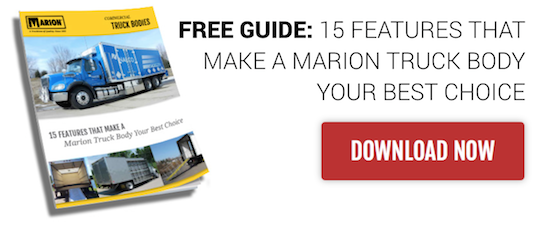7 Questions to Ask Before Buying Your Next Commercial Truck Body
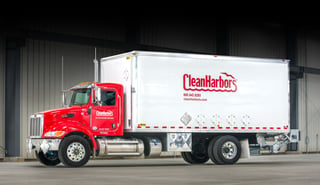
Whether you decide to work with a chassis dealer or direct with the truck body manufacturer, be sure to ask yourself the following 7 questions to make sure you get the perfect truck body for your business.
1. What’s the budget?
Small or large your company has a budget and before you even start thinking about what kind of features you want on your truck body, you have to know how much money you can spend. This will help you and your chassis dealer or salesperson begin your search in the proper price range, and assist you in choosing the options that will provide the best value for your money. Remember, this truck body is an investment in your business, and you want all investments to pay off.
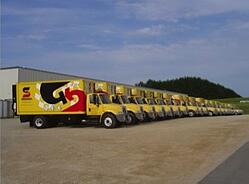 2. What will be the vehicle’s primary job?
2. What will be the vehicle’s primary job?
Now that you’ve determined your price range, the most important step is figuring out the specific tasks this vehicle will be used for. At Marion, we have built bodies for a variety of different industries with many specialized specifications. Understanding the needs that must be met with your new truck body will help to narrow down the standard and special features that will be built into your body. Once you know what it will be used for, you can start designing the rest of the truck around that function. Ask the people who will be using the truck – going to the source will help determine the needs. If needed the sales staff at Marion is willing to ride along with your driver so that they completely understand what your needs are. They are then able to offer suggestions for time saving and safety options. Understanding your needs, and giving you a product that will meet those needs, save you money, and work safely is our priority.
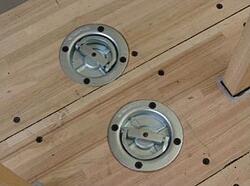 3. Will the vehicle have a secondary job?
3. Will the vehicle have a secondary job?
Although your commercial vehicle might only serve one, specialized need, some commercial vehicles can be used to serve multiple functions. For example, your mobile maintenance vehicle might also serve as a short-haul equipment transporter, so you’ll have to make sure it’s built to accommodate both of those needs. You may need load bars, logistic straps, tie rings, or a combination of two or more of these. Thinking ahead to future needs and multiple uses for a singular unit can save time and money for future purchases.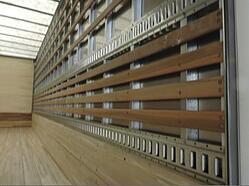 4. How big are the items you’re transporting (size and weight)?
4. How big are the items you’re transporting (size and weight)?
Know your cargo. Now that you know what the truck will be used for, it’s time to start designing the truck body so it can do its job in the best way possible. For example, if you need a truck that can transport 10 hot tubs, you’ll have to design a storage area that’s large enough to fit 10 hot tubs and transport them securely. Understanding your capacity needs will help develop the proper sized body. How wide, how high and how long – all basic questions but must be answered in order to provide the body that will fit those needs. You will also need to know how to properly secure your cargo to prevent loads shifting and potential accidents that you may be liable for. Be sure to keep in mind the weight of your cargo as well, since you’ll eventually have to find a chassis that can support that payload.
5. What are the operator’s qualifications?
Are your drivers CDL-certified? If not, you’ll have to select a truck body option that doesn’t require its operator to have a CDL license. Trucks over 26,000 lbs. GVWR require a CDL-commercial driver’s license. Understanding these restrictions will help determine the type of truck body and chassis combination that will meet your needs.
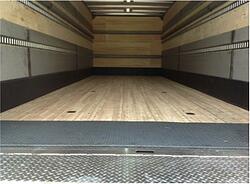 6. How will the truck be loaded/unloaded?
6. How will the truck be loaded/unloaded?
If you’ll be using your truck primarily at loading docks, you might not need a lift gate to help you load your cargo. On the other hand, if you’ll be loading and unloading from street level, a lift gate can be a lifesaver. We have access to approximately 300 different liftgates from various manufacturers, all with comparable products; we will be able to help you choose the best liftgate for your operation and product. Likewise, if you plan on using forklifts to load and unload your truck, it’d be wise to invest in more durable floors and a larger storage area. Luckily for Marion customers, most of our commercial truck bodies come standard with a protective, 24-inch steel tread plate for forklift loading/unloading, as well as a rear door opening height of 86” – 2 ½” more than the OSHA standard for forklifts.
7. Which features are needs vs. wants?
With all the available options to choose from (e.g., floor thickness, interior capacity size, rolling door options, rear frame), the cost of your commercial truck body can add up quickly if you aren’t selective. In the end, the goal is to design a truck that does its job in the best way possible, so make sure you’ve included all the features that you absolutely need before using any leftover budget for the extras.
Buying a new commercial truck body is an important investment for any business. You rely on this truck to keep your business functioning, so it’s crucial that it’s built to last and fits your business’ needs. By answering these 7 questions, however, you’ll be able to help select the perfect commercial truck body for your business.


